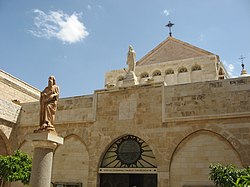Church of Saint Catherine, Bethlehem
| Church of Saint Catherine | |
|---|---|
Ecclesia Sanctae Catharinae | |
 | |
 | |
| 31°42′16.4″N 35°12′28.0″E / 31.704556°N 35.207778°E | |
| Location | Bethlehem, West Bank |
| Country | Palestine |
| Denomination | Catholic Church |
The Church of Saint Catherine[1] or Chapel of Saint Catherine (Latin: Ecclesia Sanctae Catharinae, Arabic: كنيسة القديسة كترينا, Hebrew: כנסיית קתרינה הקדושה) is a Catholic religious building located adjacent to the northern part[2] of the Basilica of the Nativity in Bethlehem[3][4] in the West Bank, Palestine.[5] It works as a parish church[6] and Franciscan monastery.[7] There is a complex of caves underneath the church.[6]
It is administered by the Latin Patriarchate of Jerusalem, follows the Roman Rite, and is included in the UNESCO World Heritage List since 2012 as part of the "Birthplace of Jesus" World Heritage Site.
History[edit]
Byzantine period[edit]
St Jerome's monastery was possibly located at the site of the medieval cloister, its foundations laying hidden under the current pavement laid by Barluzzi.[citation needed]
Crusader period[edit]
Augustinian monastery.
Mamluk period[edit]
A small chapel, located near the site of the current altar of St Catherine of Alexandria, was dedicated to the Alexandrine saint in 1347 as part of the Franciscan monastery.[8] The church is first mentioned in the 15th century.[7][dubious ]
Late Ottoman period[edit]
The church in its current shape is the result of work from the 19th century.[6] It is built in Neo-Gothic style.[citation needed] It was extended in 1881 with funds provided by Emperor Franz Joseph I of Austria-Hungary.[7]
After World War II[edit]
The Crusader-period cloister was restored in 1948 by Italian architect Antonio Barluzzi.[7]
Connection to St Catherine[edit]
The medieval chapel was built at the alleged site of Jesus' apparition to St Catherine, where he announced her of her coming martyrdom.[7]
Televised Christmas Mass[edit]
This is the church where the Latin Patriarch of Jerusalem celebrates Midnight Mass on Christmas Eve.[6]
Relic of the Holy Crib[edit]
Tradition has it that Patriarch Sophronius of Jerusalem has sent the relics of the wooden manger in which Jesus was born to Pope Theodore I in the 640s, soon after the Muslim capture of Jerusalem.[9] Others claim that it was Empress Helena who brought the relic (see her 326-28 pilgrimage).[10] The pieces of wood, known as the Holy Crib (sacra culla or cunabulum[clarification needed][11]), have been kept in the Basilica of Santa Maria Maggiore in Rome.[9][12] Shortly before Christmas 2019, Pope Francis has sent a small fragment to Bethlehem via Jerusalem, after specialists extracted it from the larger relic.[9] [13] [14] It has since been venerated at St Catherine's, where it is meant to remain "forever",[15] at a side altar of the southern nave.
Gallery[edit]
-
Catholic Mass in the church
-
The organ of St. Catherine
-
One of the stained glass windows
-
View from the main altar
-
Restored medieval cloister
-
Restored medieval cloister and courtyard
See also[edit]
References[edit]
- ^ Church of St. Catherine in Bethlehem at GCatholic.com
- ^ Rapp, David (28 November 2015). The Church of the Nativity in Bethlehem. Hanan Isachar Photography. ISBN 9789657000083.
- ^ Cornell, George W. (1 January 1966). Voyage of Faith: The Catholic Church in Transition. Odyssey.
- ^ Wareham, Norman; Gill, Jill (30 November 2011). Every Pilgrim's Guide to the Holy Land. Canterbury Press. ISBN 9781848251045.
- ^ Isaac, Rami; Hall, Colin Michael; Higgins-Desbiolles, Freya (1 January 2015). The Politics and Power of Tourism in Palestine. Routledge. ISBN 9781317580287.
- ^ a b c d "Church of St Catherine of Alexandria". See The Holy Land. 11 March 2010. Retrieved 30 April 2016.
- ^ a b c d e "Church of St. Catherine - Bethlehem". www.sacred-destinations.com. Retrieved 30 April 2016.
- ^ "Church of St. Catherine". www.bethlehem.custodia.org. Archived from the original on 4 March 2016. Retrieved 30 April 2016.
- ^ a b c "Relic thought to be from Jesus' manger arrives in Bethlehem". NBCnews.com. The Associated Press. 30 November 2019. Retrieved 24 December 2023.
- ^ Craughwell, Thomas J. (2011). "Holy Manger (first venerated in the fourth or seventh century)". Saints Preserved: An Encyclopedia of Relics. Crown Publishing Group. pp. 123–124. ISBN 978-0307590749. Retrieved 24 December 2023.
- ^ Longhurst, Christopher. "A Roman Christmas Ritual: Micro-Architecture and the Theatre of the Presepio". Sacred Architecture. 16 (Fall 2009). The Institute for Sacred Architecture. Retrieved 24 December 2023.
- ^ "From Holy Crib to Manger Scene - The Story of the Crib of Bethlehem". Platte City, MO: Society of Saint Pius X (SSPX). Retrieved 24 December 2023.
- ^ Giovanni Malaspina (29 November 2019). "Holy Crib handed over to the Custody of the Holy Land". custodia.org. Custodia Terrae Sanctae. Retrieved 24 December 2023.
- ^ Cindy Wooden (2 December 2019). "Pope returns part of relic of Jesus' crib to Holy Land". National Catholic Reporter. Kansas City, Missouri. Retrieved 24 December 2023.
- ^ "Relic of Jesus' crib to return to Holy Land after over 1,000 years". The Guardian (Nigeria). Agence France Presse. 29 November 2019. Retrieved 24 December 2023.
External links[edit]
- Photos of St Catherine's Church at the Manar al-Athar photo archive








